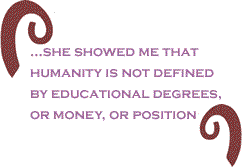
|
||||||||||||||||||||||
 |
||||||||||||||||||||||
 |
||||||||||||||||||||||
 |
||||||||||||||||||||||
 |
||||||||||||||||||||||
 |
||||||||||||||||||||||
 |
| The current issue is always free to everyone |
|
|
 |
First, I want to thank BlackCommentator.com for this creative and timely idea, an issue devoted to motherhood in our communities...powerful, indeed! My thoughts about motherhood...I would like to take the opportunity to say a few words about my grandmother, Esperanza Guzman. But, of course, everything is connected to everything...so, I want to also express my gratitude to my parents, James Jennings, Sr., and Natividad Baez Jennings. My abuela, Esperanza Guzman, after whom my wife,
Lenora, and I named one of our daughters, Taleah Esperanza
Jennings, died about 20 years ago. Almost every summer from
a child until 16 years of age, my parents would ship me
from NYC to a small barrio in Rio Piedras, Puerto Rico, called,
We did not have “modern” plumbing in Abuela's
house in There are so many lessons I learned from her,
and which I only appreciated much later in my life. I can only
comment on but a few thoughts in this short space. My abuela
showed me, in her daily struggles for family survival, and in
her responses and resistance to subtle and not-so-subtle insults
heaped upon her as she cleaned homes in viejo These kinds of resources are especially evident among our mothers. Motherhood has represented a very powerful, though quiet and invisible, at times, resource in our communities. How do we use this kind of resource as a basis for social change? How do we approach motherhood to make this a basis for how we treat all children in our communities so that they understand and value the values of respect and dignity for all people, again, regardless of their position in society? BlackCommentator.com Editorial
Board Member James Jennings, PhD - Professor of urban and environmental
policy and planning at
|
Your comments are always welcome. e-Mail
re-print notice
If you send us an e-Mail message we may publish all or part of it, unless you tell us it is not for publication. You may also request that we withhold your name. Thank you very much for your readership. |
|
| May
8, 2008 Issue 276 |
|
| Executive Editor: Bill Fletcher, Jr. |
| Managing
Editor: |
| Publisher: Peter Gamble |
| Est. April 5, 2002 |
| Printer Friendly Version in resizeable plain text format format or pdf format. |
 |
 |
 |
| |
| |






















 Although
NYC's Bedstuy is my “hometown”, as a youth, I never knew
this place between one day after the school year ended, and
one or two days before the new school year would begin. As a
child and teen I was always frustrated that I had to leave my
friends at the end of the school year and not see them until
the new school year when I returned from
Although
NYC's Bedstuy is my “hometown”, as a youth, I never knew
this place between one day after the school year ended, and
one or two days before the new school year would begin. As a
child and teen I was always frustrated that I had to leave my
friends at the end of the school year and not see them until
the new school year when I returned from 







